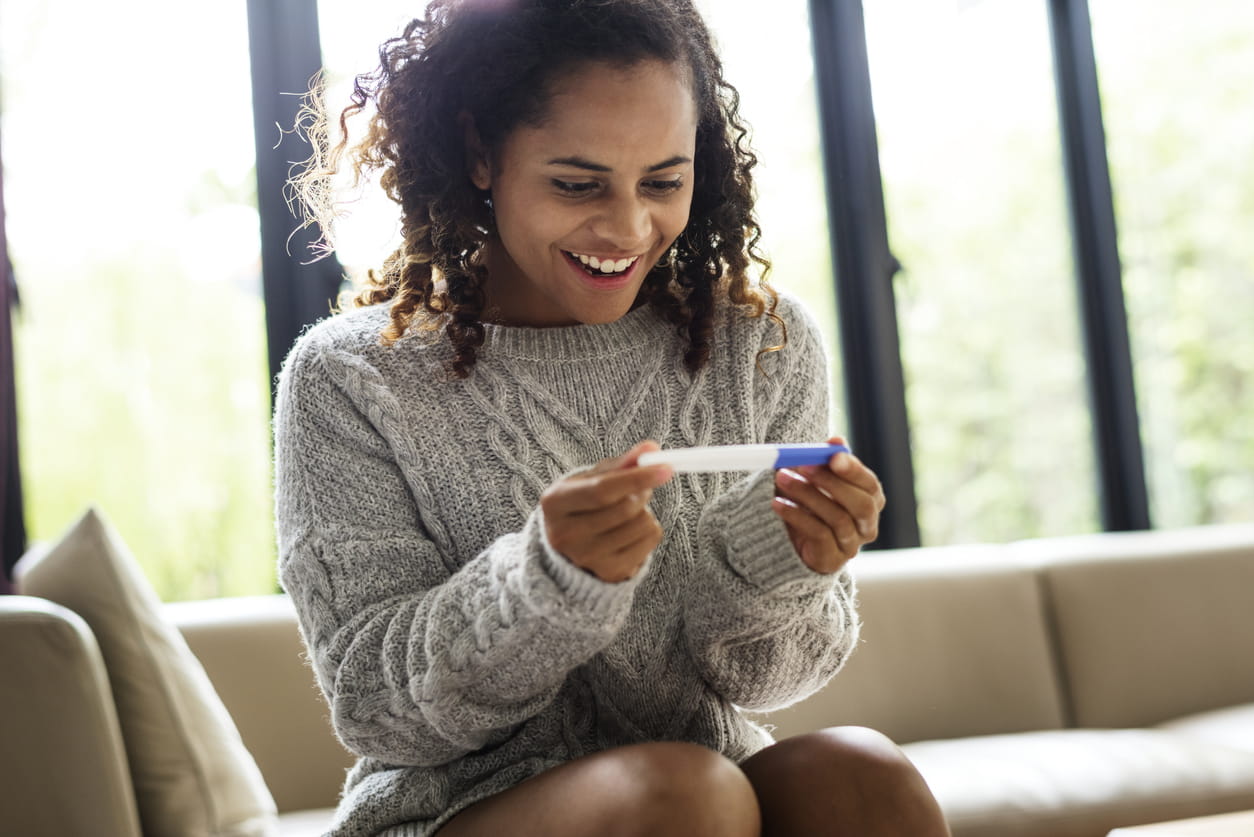What's The Best Time To Take a Pregnancy Test?

Whether you’re hoping for a positive or negative result, taking a pregnancy test can be an anxiety-filled experience. You may wonder how accurate a home pregnancy test is, and how soon you can trust your test.
While at-home pregnancy tests are convenient and fairly accurate when taken at the appropriate time, it’s normal to second guess whether you’ve received a false-negative or false-positive result.
Could the time of day you take a pregnancy test also influence the accuracy of the results?
Many people recommend taking a pregnancy test first thing in the morning, but does taking a pregnancy day earlier in the day vs at night actually impact the results?
Get peace of mind by learning when the best time to take a pregnancy test is, what type of pregnancy test is most accurate, and how to understand your at-home test results.
Related: Which Clearblue Pregnancy Test Should I Take?
What Type of Pregnancy Test Should You Take?
There are many different types of pregnancy tests available that can be done by a healthcare provider or at home. Blood tests, urine tests, and ultrasounds can all test for pregnancy, but some of these tests are more accurate than others depending on how far along you are in your pregnancy.
Blood Test
According to the Cleveland Clinic, blood tests can detect pregnancy earlier than urine tests, 7-10 days after conception. They are also more sensitive, and not only detect the presence of hCG (the pregnancy hormone) but also the amount of hCG in your blood.
Because hCG doubles in early pregnancy approximately every 2-3 days, a blood test may be repeated in order to compare the results. This can be helpful to determine if there is normal growth, or a possible problem with the pregnancy, and a high result can be an indication of twins
Urine Pregnancy Test
The most common type of pregnancy test is a urine pregnancy test, which detects the presence of HCG in urine but can’t measure the amount. These can be done in a doctor’s office, but are typically bought over the counter and performed at home. These test kits come in a few different types – a test strip, a cassette, a midstream, or a digital test.
An at-home urine pregnancy test is a great option when done at the correct time because they are affordable, accessible, easy to use, accurate, and typically gives a result in just a few minutes.
Ultrasound
An ultrasound scan can also be done by your OB-GYN or healthcare provider to detect pregnancy. An ultrasound may be recommended by your healthcare provider in conjunction with a blood test, or when you start pregnancy care.
Ultrasound is typically not the first choice for a pregnancy test as ultrasounds are more expensive than other testing methods, require making a medical appointment, and aren’t as easily accessible as a blood or urine test.
What is the Best Time of Day to Take a Pregnancy Test?
Previously, it was widely thought that urine pregnancy tests had to be done the first time you go to the bathroom in the morning.
While this may result in an earlier positive test due to urine (and the hCG hormone in your urine) being concentrated while you sleep overnight, you can actually take a test any time of the day or night! If you are taking a test on the very first day of your missed period, you may get a more accurate result by taking the test in the morning.

However, if you have missed your period for a few days, you can take the test at any point in the day. If you suspect that you are pregnant and you get a negative result, it’s recommended to repeat the test in a few days to a week, which is the reason why a lot of over-the-counter test kits come with two tests in the package.
How Soon After Sex Should You Take a Pregnancy Test?
Knowing when you should take a pregnancy test to receive the most accurate results, it helps to understand the fertilization and implantation process.
According to the UCSF Center for Reproductive Health, the sperm and egg join in the fallopian tube, which must occur 12-24 hours after ovulation to successfully lead to fertilization. Because sperm can live up to 5 days, fertilization can occur 5 days after intercourse.
After fertilization, it takes 3-5 days for the fertilized egg to travel from the fallopian tube to the uterus for implantation.
Since only 50% of fertilized eggs successfully make the trip, fertilization doesn’t always lead to pregnancy. However, if everything goes correctly, the fertilized egg implants into the uterine wall, the placenta will form, and the body will begin to produce the pregnancy hormone (hCG) that is detected by pregnancy tests.
According to the FDA, hCG can be detected in your urine approximately 12-15 days after ovulation, which is the approximate time that you would expect your next period to occur if you have regular periods.
What Medications or Substances to Avoid Before Taking a Pregnancy Test?
You do not need to stop taking any specific medications prior to taking a pregnancy test unless you are taking a medication used for fertility treatments that contain hCG, in which case your healthcare provider will guide you on how to approach testing.
The only things you need to do are: wait until you have missed the first day of your period, read the test kit instructions before use, and take the test according to the package instructions making sure you read the results after the correct amount of time has passed.
No need to drink extra water ahead of time to hydrate as this may dilute your urine and cause a false negative.
How Soon Will an At-Home Pregnancy Test Read Positive?
A home pregnancy test works by measuring the amount of hCG in your urine. So, when exactly will your body produce enough of this pregnancy hormone to give a positive test result?
According to Mayo Clinic, the most accurate pregnancy test results occur one day after your missed period, or later. They explain, "During early pregnancy, the hCG concentration increases rapidly — doubling every two to three days. The earlier you take the home pregnancy test, the harder it might be for the test to detect hCG."
Some pregnancy tests claim to be able to detect hCG in the urine earlier than the first day of your missed period, however, waiting until this time is the best way to ensure a more accurate test result. This is because this hormone is triggered by the growth of the placenta, which only occurs after a fertilized egg is implanted into the uterine wall.
While some tests may be able to pick up hCG earlier than others, it’s best to wait until you have missed the first day of your period to test.
Implantation Bleeding Vs. Period Blood
If you're waiting for a missed period to take a pregnancy test, it's important to keep in mind that many people experience implantation bleeding, which happens when the fertilized egg implants into the uterine wall. This bleeding typically lasts a few hours to a few days and is usually more like light spotting than a true period.
Sometimes this implantation bleeding can be confusing, and you may think you have had a period. If you suspect you may be pregnant and are having early pregnancy symptoms such as nausea, vomiting, breast tenderness/fullness, frequent urination, increased fatigue, and abdominal bloating. These early signs of pregnancy are also reasons to take a pregnancy test, regardless of the timing of your first period.
Should You Take Multiple Pregnancy Tests?
Some people choose to take multiple tests due to anxiety about the result, whether it’s positive or negative. Sometimes you may suspect that you are pregnant but get a negative result, in this case, it’s recommended to retest in 2-7 days.
In other cases, a pregnancy test may display a positive result, but you’ll want to take multiple pregnancy tests to confirm. While this method may sometimes be confusing due to the potential for getting mixed results, the only harm that comes from it is the cost of the tests.
If you continue to miss your period but are getting negative pregnancy tests, you are getting mixed results with multiple tests, or need reassurance about the results you are seeing, these are all reasons to call your midwife or OB/GYN to schedule an appointment. They will likely order a blood test, and maybe an ultrasound, depending on how long it has been since your last period.
Can You Have a False Positive or a False Negative Pregnancy Test?

A false negative pregnancy test is common, and there are a few reasons this might happen. The first and most common reason is taking a pregnancy test too early. It’s easy to miscalculate your missed period, especially if you experience irregular menstrual cycles. If you're in the early stages of pregnancy, you might not have high enough levels of hCG for a urine test to detect.
Not taking the urine test correctly is another way to receive a false negative. This could happen if you check the results too soon, have diluted urine due to drinking excessive amounts of water, or don’t saturate the test properly.
On the other hand, a false positive pregnancy test is fairly rare. According to the Cleveland Clinic, some potential causes include: Waiting too long to read the results, a recent pregnancy loss, recent abortion, fertility medications (especially hCG injections), early miscarriage, or a chemical pregnancy.
The best ways to avoid an inaccurate result are to follow the package insert instructions, make sure to wait until you have missed the first day of your period and consider taking the test in the morning if you are taking it on the very first day of your missed period.
What is a “Chemical Pregnancy?”
A chemical pregnancy is when you have a fertilized egg but it doesn’t implant, or it does implant but you experience a miscarriage prior to the fifth week of pregnancy. You may have a positive pregnancy test, but most often no early pregnancy symptoms, and usually start a period within a few days to a week past when you expected it.
The term “chemical pregnancy” is used because while the pregnancy hormone hCG can be detected by a pregnancy test, the pregnancy does not typically develop to a point that can be detected by ultrasound.
Can an Ectopic Pregnancy be detected by a Pregnancy Test?
An ectopic pregnancy is a pregnancy that occurs anywhere outside of the uterus and is a very rare medical emergency. With an ectopic pregnancy, you would still have a positive pregnancy test, but would also likely experience vaginal bleeding, pain in the lower abdomen, low back, or pelvis, dizziness, feeling weak, or fainting.
If any of these symptoms occur, you should be evaluated in the emergency department immediately.
When Should I call My healthcare provider?
If you have a positive pregnancy test and then begin bleeding, if you take a few tests and have mixed results and are unsure if you are pregnant or not, or if you continue to miss periods and have negative pregnancy tests, these are all reasons to call your healthcare provider for an appointment. Bleeding and pain are always reasons to be seen right away.
I Have a Positive Pregnancy Test, Now What?
If you plan to continue with the pregnancy, you should start taking prenatal vitamins, start adopting healthy lifestyle habits (eat a nutritious diet, get regular exercise, avoid alcohol, illicit drugs, and smoking), and call your midwife or OB/GYN to start prenatal care.

